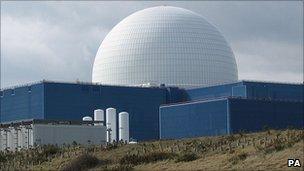Huhne warns over rushing to 'nuclear judgements'
- Published

The government has argued that nuclear has a definite role to play in the UK's future energy supply
Energy Secretary Chris Huhne has warned people not to "rush to judgement" about the safety of nuclear power as a result of the crisis in Japan.
Mr Huhne said safety procedures in the UK were "robust" but ministers should not be "complacent" and it was sensible to review the existing regime.
But MPs have urged Mr Huhne to do more to reassure the public.
Ministers were earlier briefed on the current situation in Japan by chief scientific adviser Sir John Beddington.
The cabinet discussed the future of UK nuclear policy on Tuesday amid moves by some European countries for a review of expansion plans and a call by the European Union to "stress test" existing facilities.
'Full facts'
In Japan there have been three explosions at the Fukushima nuclear plant since Friday's earthquake and tsunami. Radiation leaks have reached harmful levels for local people.
Mr Huhne has asked Chief Nuclear Inspector Dr Mike Weightman to review the safety of UK plants and urged people to wait for his findings. Appearing before the Energy Select Committee, the Lib Dem minister warned against politicians "grandstanding" on the issue of nuclear safety and said Dr Weightman was the "right person" to review current procedures.
"We should not rush to judgement," he told MPs. "Let's wait until we have got the full facts."
He said he believed safety was a "very high" priority for the industry and existing procedures were "extremely effective".
But he added: "Does that mean I am going to be a complacent and say we have no lessons to be learned from Japan? No.
"Although obviously there are major differences between our situation and the Japanese situation, both in terms of luckily not being in an earthquake zone and not suffering the secondary consequences of the tsunami, there may be parallels in how robust our back-up systems can be - for example when it comes to the diesel generating electricity powering our cooling systems.
"We have to be open-minded about that and make sure we are learning the lessons."
'Allay fears'
But Tory MP Tim Yeo said officials needed to do more to remind the public of the UK's "incredibly safe" nuclear record while Labour MP John Robertson urged Mr Huhne to state categorically that safety was "second to none" and "in tip-top condition".
"What I am looking for, from you, is to allay the fears - rightly or wrongly - of the people of this country who do think these things could happen here. I would like you to go and tell people that this country is safe for nuclear energy."
Announcing the review on Monday, David Cameron said the UK must "learn lessons" from Japan.
But he has made it clear that the UK is not prone to seismic activity of the kind seen in Japan and UK plants do not use the same technology.
All but one of the UK's existing nuclear reactors are scheduled to close by 2023 and eight locations have been shortlisted for replacements.
Although a majority of MPs in Parliament - including most Conservatives and Labour members - are in favour of replacing them, several have called for a rethink in light of current events. SNP MP Mike Weir has said the UK should "pause for thought" over its nuclear plans while Labour MP Paul Flynn has urged ministers to "look again at our rush to nuclear" - citing public concerns and the danger posed to nuclear plants by natural disasters and terrorist attacks.
'Stringent controls'
The nuclear industry insists safety and regulatory controls already in place are "stringent", that existing plants are built to withstand "credible seismic scenarios" and it is "confident" about the future of nuclear in the UK.
Engineering experts say future reactors will be designed using more advanced technology - specifically not requiring power sources such as generators to cool them after a emergency shutdown - making them "inherently safer".
But the Japanese crisis is also seen as a reminder of the need to deal with the legacy of decades of nuclear generation.
"In the UK, of much more concern is the safe and rapid decommissioning of our existing radioactive waste storage facilities, some of which are in a highly hazardous state," said Professor Neil Hyatt, from the University of Sheffield.
Anti-nuclear campaigners have said the radiation leaks in Japan following the tsunami show that nuclear "cannot ever be safe".
"Japan's nuclear plants were built with the latest technology, specifically to withstand natural disasters, yet we still face potential meltdown," said Steve Campbell, from Greenpeace.
- Published15 March 2011
- Published19 October 2010
- Published18 October 2010
- Published14 March 2011